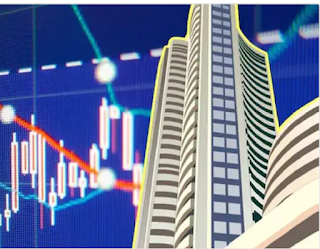The S&P BSE Sensex lost 166.33 points to close at 78,593.07, while the NSE Nifty50 ended at 23,992.55, shedding 63.05 points. Benchmark stock market indices closed lower on Tuesday, dragged by a decline in heavyweight financials amid global uncertainties, which led to profit booking.
"Taking cues from the global markets, the domestic market closed on a negative note. The correction was primarily driven by disappointing US job data, which caused worries about a potential recession in the US as the unemployment rate reached 4.3%. Many Indian companies have exposure in Bangladesh, Japan's bank rate increase, and further escalating geopolitical tensions in the Middle East," said Vaibhav Vidwani, Research Analyst at Bonanza Portfolio Ltd.
"The sharp decline is largely in response to the recovery in equities seen early in the day following the global rout yesterday. But the drop in VIX is not seen sustaining, and the pullback above 18 reflects that the Indian market remains sensitive and vulnerable as global events unravel, with Nifty just having turned from a 10-period long stretch of month-on-month peaks," said Anand James, Chief Market Strategist at Geojit Financial Services.
Aditya Gaggar, Director of Progressive Shares, noted that although there was a strong opening reaching higher levels during early trading, the index failed to hold its gains and gradually erased them. "In the second half of trading, selling pressure intensified, and the index wiped off all its gains to end the session at 23,992.55 with a loss of 63.05 points. A mixed trend was seen across the board, where Realty and IT were the top gainers, while PSU Banks corrected the most, followed by Auto. From the broader markets, Midcaps and Smallcaps corrected by 0.61% and 0.39%, underperforming the Frontline Index," he added.
Gaggar said that the near-term outlook for Nifty50 has turned bearish unless it gives a convincing move above 24,400, while on the downside, the 50DMA support at 23,880 will be considered immediate support.
"Investors are watching the appreciating Yen, weak US economic data, and rising geopolitical tensions. They are now exercising caution and shifting towards defensive sectors such as FMCG, IT, and pharma. Nonetheless, the market is looking forward to the decline of crude prices and potential rate cuts by the US Fed and RBI to mitigate the downturn risk," said Vinod Nair, Head of Research at Geojit Financial Services.
The market's response to global uncertainties underscores the interconnectedness of global financial systems and the impact of international developments on domestic markets. Investors and analysts alike are closely monitoring these trends, understanding that the economic landscape is highly dynamic and influenced by a multitude of factors. The current sentiment reflects a cautious approach, with a focus on sectors perceived as safer bets amidst volatility.
Adding to the negative sentiment, concerns about the global economic outlook have been exacerbated by geopolitical tensions, including the ongoing conflict in the Middle East and the complex trade relationships between major economies. These factors have contributed to a risk-averse atmosphere in financial markets, prompting investors to seek refuge in traditionally stable sectors.
The real estate and IT sectors emerged as the top gainers, benefiting from investor preference for sectors considered less vulnerable to economic cycles. On the other hand, PSU Banks faced significant corrections, reflecting the broader concerns about financial stability and credit risk in the current economic climate. The auto sector also experienced a downturn, highlighting the challenges faced by industries directly linked to consumer spending and economic growth.
In the broader markets, Midcaps and Smallcaps underperformed the Frontline Index, with corrections of 0.61% and 0.39%, respectively. This trend indicates a cautious approach by investors towards smaller and potentially more volatile companies, in favor of more stable and established firms.
The decline in the S&P BSE Sensex and NSE Nifty50 points to a market grappling with a range of global and domestic challenges. The path forward will likely be shaped by how these factors evolve and the market's ability to adapt to new information and changing conditions. The current environment underscores the need for a vigilant and strategic approach to investing, balancing short-term risks with long-term opportunities.
In conclusion, the market's performance on Tuesday reflects a complex interplay of global and domestic factors, with significant implications for investors and policymakers alike. As the situation continues to evolve, maintaining a flexible and informed investment strategy will be crucial for navigating the uncertainties ahead.



